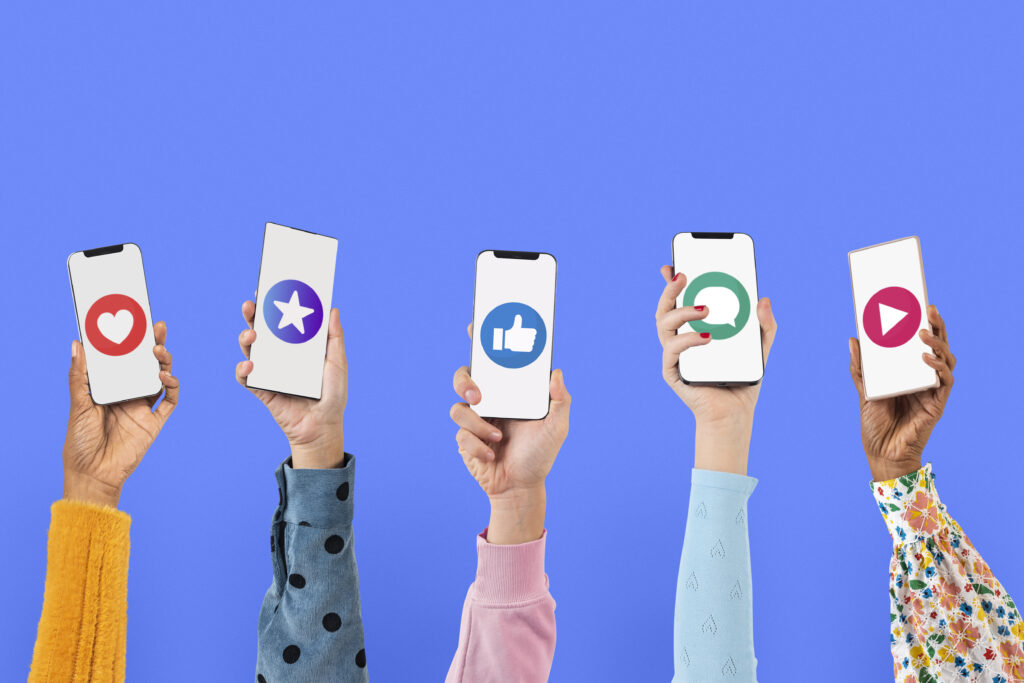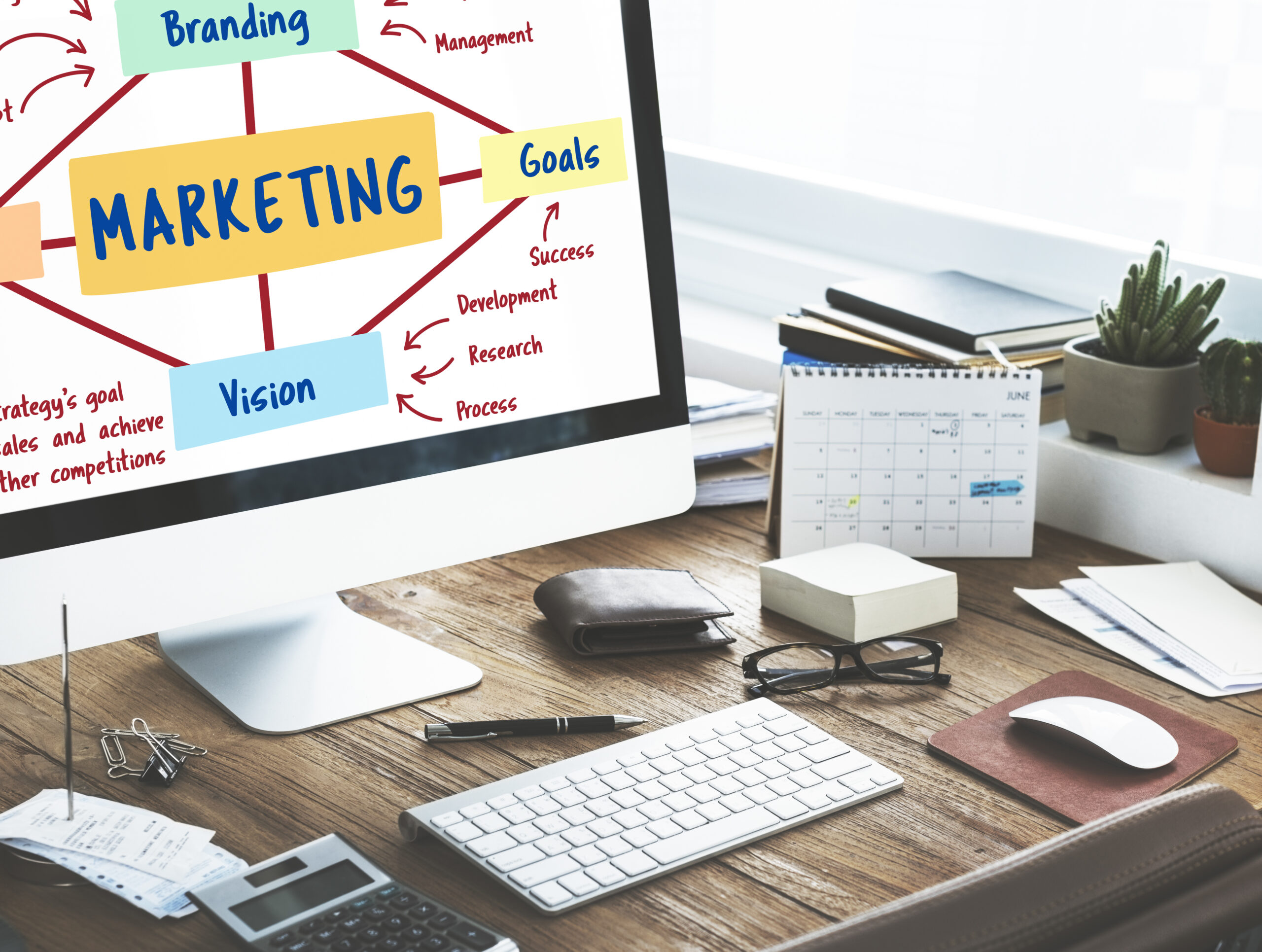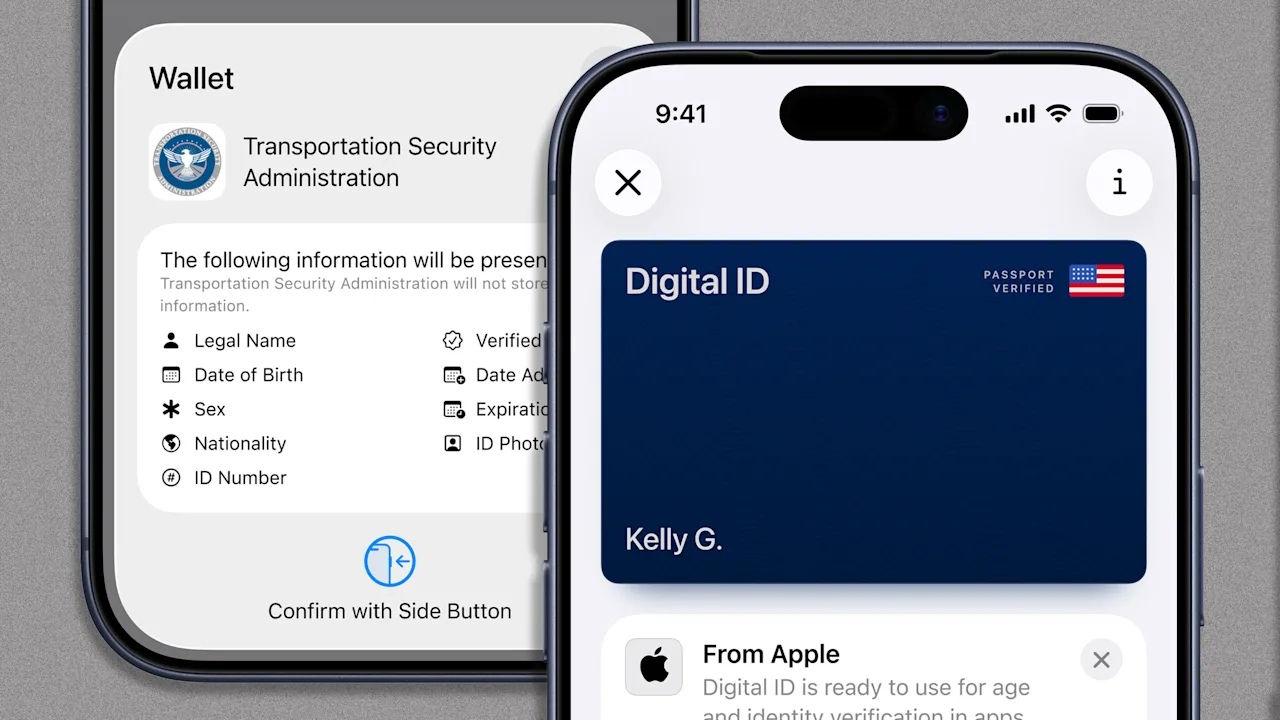By Anna Jordan on Small Business UK – Advice and Ideas for UK Small Businesses and SMEs

You may have heard endless praise for digital marketing and how it can revolutionise your business – but where on earth (or, indeed, on the web) do you start?
Here are eight digital marketing solutions that you can implement into your small business. See which ones work best for you. Read on for the whole guide or jump straight to your preferred section.
- Google/Bing
- SEO
- Social media
- Content marketing
- SMS / WhatsApp
- Affiliate/influencer marketing
- Display banner ads
- Email marketing
1. Google / Bing (Paid PPC)
Pay-per-click (PPC) marketing involves businesses paying a fee every time someone clicks on their ad. It can be used on social media, but in this case, we’re talking about search engines such as Google and Bing. What you’re trying to get out of it is a boost to your brand visibility, more leads and more sales.
Pros
- Clicks are intent-based as you’re running ads against the keyword being searched for
- The results are easy to measure
- You can see the impact of your campaign almost instantly
Cons
- The aforementioned traffic may not necessarily lead to sales
- It takes practice to build up the skills for an effective PPC campaign
- Your PPC campaigns need continual optimisation and other maintenance
2. SEO (Organic)
SEO (or search engine optimisation) makes it even easier for people to find you. You optimise your content using the very keywords that your target market is searching for. Platforms such as ahrefs and SEMrush can tell you how your content is performing and which keywords and topics you should be targeting next.
Pros
- Can give a substantial return on investment over time
- Ranking highly on search engines gives you brand authority
- Directly targets users looking for the information you’re supplying
Cons
- You won’t see the fruits of your effort straight away – it could take weeks or months for traffic to build
- You need to keep updating and optimising content to keep it high in the search rankings
- Skilled SEO professionals are invaluable in continued SEO success, and they can be costly to hire
Read more: Small business SEO: 6 easy wins to boost your website ranking – Your small business SEO can rank alongside big rivals on Google if you follow these six simple steps
3. Social media (Organic / Paid)
Social media might’ve been your first guess on the digital marketing solutions front. When we talk about social media, we can mean organic posts or posts that you’ve paid to be promoted. This is on top of reels on Instagram or Shorts on YouTube, for example, and other content sharing formats.
Pros
- Social media audiences are active users, leading to more engagement
- They have their own dashboards and analytics
- Can be a more affordable form of marketing
Cons
- A lower barrier to entry means a saturated marketplace and a lot more competition
- Social media platforms can deactivate your account at a moment’s notice and without explanation
- Algorithm changes make it difficult to plan longer-term campaigns
Read more: A guide to social media strategy for small business owners – we present this guide to social media strategy to help your small business grow

4. Content marketing
Maximising your content helps you build an invested audience who you’ve gained trust with through regular, reliable content. It helps to have someone with expertise in the area creating this content as search engines can connect their author profile to their profiles on other parts of the web to bolster their authority and help the content perform better, linking up back to the trusty SEO.
Pros
- A great way to build trust by supplying reliable information
- Can easily be integrated with other areas of your marketing strategy
- May create audience loyalty, especially if you have regular writers, columns or series
Cons
- It can take a piece of content a long time to build up traffic
- You need consistency to attract returning users
- May be higher budget than other digital marketing methods
Read more: Why content marketing is essential for a small business – Here, Rebecca Beale, a content specialist for Tecmark, tells us why content marketing is so important for small businesses to focus on
5. SMS / WhatsApp
SMS is a relatively untapped market but comes with the promise of a high open rate, as everyone’s on their phones, anyway. As you’d expect, these are promotions sent by text message. Customers will have to give their consent and, with that, you’ll need to supply the option to unsubscribe at any time. It’s best for deals, new products and tips.
Pros
- Goes straight to the people you’re trying to communicate with
- Personalised for individual customers and events
- Good for quick feedback such as one-word surveys
Cons
- Tightly timed promotions might fall short if the customer doesn’t have access to their smartphone
- You may have to send a message at an awkward time for people in different time zones
- Limited by number of characters
Read more: Six tips to small business success in SMS marketing – Matthew Winters explores how your small business can use SMS marketing to its advantage
6. Affiliate / influencer marketing
Affiliate is performance-based and a big hitter following the unstoppable rise in social media. As the business, you’ll partner up with a third party (the affiliate) to promote products/service to gain users, data or sales. The affiliate will earn a commission for promotion, be that clicks or sales. Your affiliate may be a blogger, a website with a similar target audience to yours or an influencer.
Speaking of influencers, you could plump for influencer marketing instead. It’s similar in that you collaborate, but your third party is an influencer specialising in your niche. For example, you could approach a beauty influencer, you could ask them to promote your haircare products.
Pros
- Can potentially provide a passive income
- Can be lower cost
- You only pay per click or sale
Cons
- Not an ideal way to build customer relationships or loyalty
- Again, visibility and income may be affected by algorithm changes
- An inconsistent level of income
Read more: Affiliate marketing – what is it and what can it do for your business? – Not just reserved for large brands – affiliate marketing is the online channel you’re missing out on

7. Display banner ads (Paid Google)
You’ll see display banner ads across the web – these are the oblong ads typically found on webpages. It’ll feature some combination of your name, logo, slogan and a call to action. Visually striking is the name of the game here, whether you’re going for a static or animated ad.
You then use an ad network, such as Google’s, to reach your target audience through third-party websites they visit or to be put in specific places.
Pros
- Great for brand awareness
- Visually attractive
- Can be targeted at specific audiences
Cons
- Tend to have low click-through rates
- Easy to scroll past ad
- If the ad is intrusive, it could be irritating, leading to a negative association with your brand
8. Email marketing
Email marketing is as it sounds – promoting your products/services and content by email. The main aims are to reach new audiences and build trust with your current audience – bolstering your brand to boot. You could even send a variety of emails to support your content and campaigns, such as newsletters, partner content emails, event promos, one-off sales promotions and emails targeted to certain parts of your database.
Pros
- Easy to target individual parts of your database and track success
- A direct line of communication
- Much cheaper than other marketing methods
Cons
- Might be overlooked in overcrowded customer inboxes
- Could end up in spam folder
- Need to get the balance of emails right to avoid subscriber fatigue
Read more: A guide to successful email marketing – Email marketing can be an immensely important driver of engagement and brand awareness for small businesses. Here Andrea Blair from Hallam Internet, takes you through a six-step email marketing checklist
Future of advertising – AI (organic)
To keep ourselves relevant, it’s wise to look to the future of digital marketing and advertising. Of course, it’s got to be artificial intelligence (AI).
AI can boost your marketing activities and it’s more about how it can make your existing marketing efforts easier. This may be through automation, making the customer experience more individualised and giving you valuable AI-driven insights. Many platforms are already integrating AI tools into their existing offerings.
Which digital marketing solutions are right for me?
The upside of digital marketing solutions is that there’s room to experiment with different platforms. Some of them give you the option of a free trial, do flexible tiered pricing or have packages with short term commitments.
Read over reviews to get an idea of whether the pros will enhance your business and you can live with the cons. And, as always, reach out to your small business community to see what they think is worth it.
Read more
Lead generation vs brand awareness: where should leaders focus their marketing strategy? – Chasing leads or building a brand? The most effective strategies do both
How to write a marketing plan – This guide offers practical advice on developing and writing a marketing plan using simple English
The post 8 digital marketing solutions to grow your business appeared first on Small Business UK.

















Leave a comment